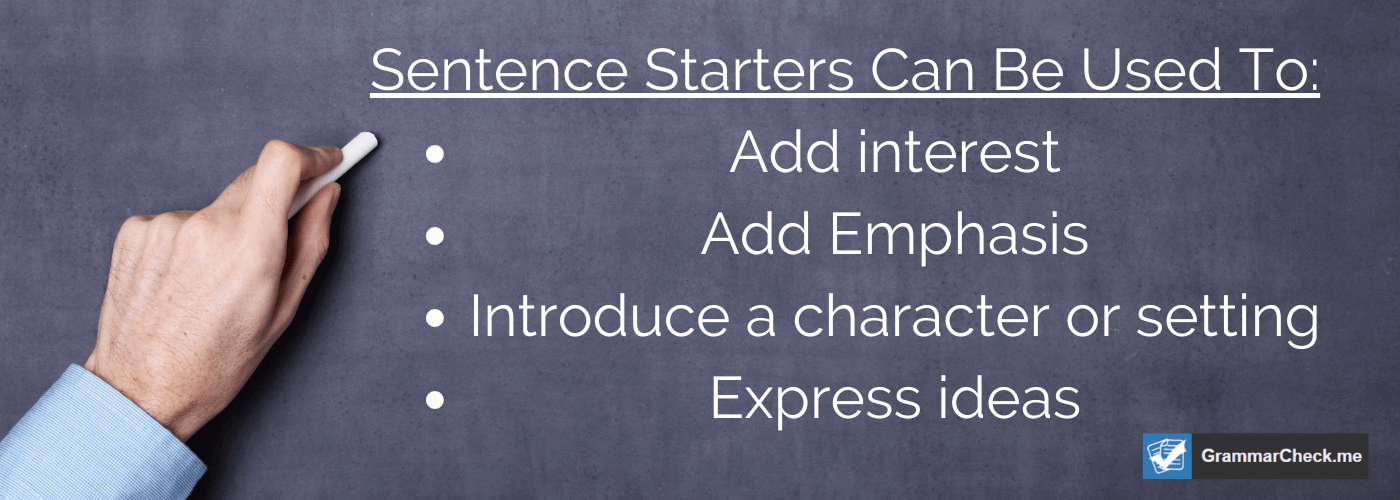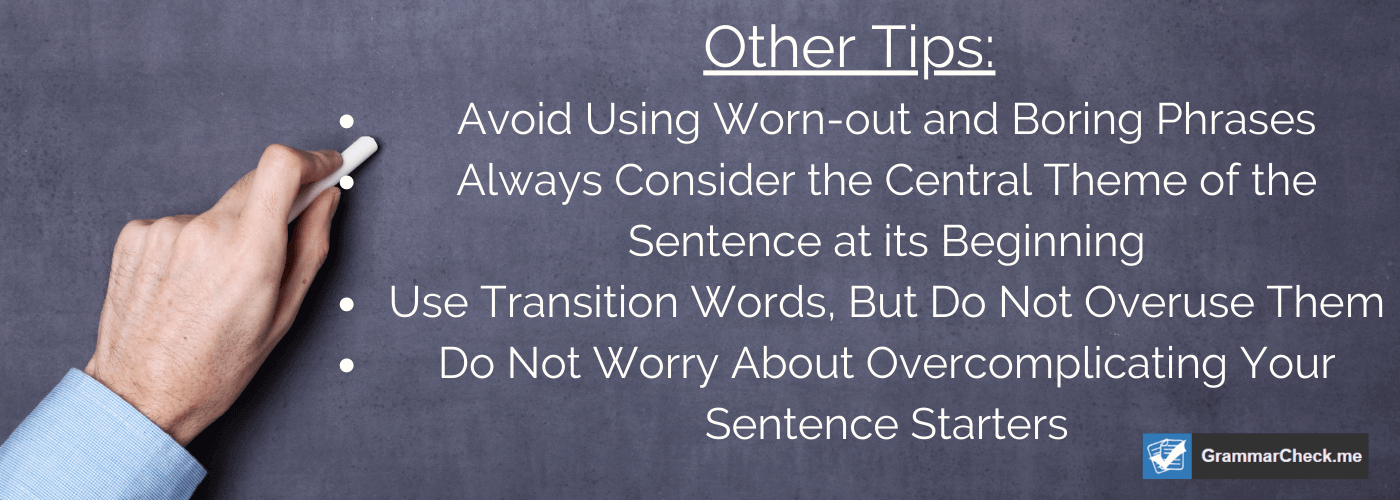If you’re like most writers, you may feel unsure about how to start your sentences. You might feel like you’re starting them all wrong, and that’s causing problems for your writing. In this post, we’ll discuss some tips on how to start your sentences – and why it’s important to do so.
Always using the right words? Make sure:
Check Your TextWhat Is A Sentence Starter?

A sentence starter is a quick word or phrase at the beginning of a sentence that helps to set the tone or direction of the sentence. This is one of the most important parts of any sentence. They can be useful for
- Writers
- Journalists
- Students
- Academics
- Bloggers
In addition to helping to set the tone, sentence starters can also be used to:
- Add interest
- Add Emphasis
- Introduce a character or setting
- Express ideas
With so many different uses, sentence starters are an essential tool for any writer. Sentence starters are important from the very first sentence to the last.
When To Use Them
Sentence starters can be used for a variety of reasons. They can be transition words, paragraph starters, or even in a topic sentence. Whether you are working on an academic research paper, writing a postcard to your parents, or persuasive writing…the opening statement in each sentence is important. And if you want to proofread your sentence…throw it in our FREE Sentence Checker!
Here are some of the best reasons to use sentence starters:
- To connect sentences.
- Introduce new ideas or main points.
- To present a conclusion.
- Emphasize a specific point or sentence.
Types Of Sentences
- Simple Sentence: Contains a single independent clause, with no subordinate clauses.
- Compound Sentence: Contains two or more independent clauses, joined by a coordinating conjunction.
- Complex Sentence: Contains an independent clause plus one or more subordinate clauses.
- Compound-complex Sentence: Contains two or more independent clauses, joined by a coordinating conjunction, plus one or more subordinate clauses.
Sentence Starters For Essay Writing
Here are some sentence starters you can use in essay writing. You’ll see some of these examples below when reading or writing prologues.
- This paper will discuss…
- In this essay…
- Here, you will find…
Sentence Starters For Persuasive Writing
Here are some sentence starters you can use in persuasive writing.
- In our opinion…
- I believe that…
- We can all agree that…
Other Tips for Starting Sentences

While you can certainly start a sentence with the word eventually, there are many other ways you can start a meaningful sentence. The following tips will help you improve your writing by starting your sentences in an impactful way.
1) Avoid Using Worn-out and Boring Phrases
Many writers fall back on weak sentence starters, as they can act as a sort of crutch when a writer is unsure how to get a sentence started.
Not only will these tired old phrases bore the reader, but they also make your writing come across as less interesting, even if you are trying to communicate a unique or thought-provoking perspective.
Examples could include the following sentence starters: “By virtue of”, “At the end of the day”, and “It is important to note that”.
While you do not have to rule out these sorts of sentence starters, you can certainly improve your writing and make it far more captivating to the reader if you come up with more engaging and unique sentence starters.
2) Always Consider the Central Theme of the Sentence at its Beginning
Before you construct a sentence, take the time to consider what meaning you want that sentence to convey. Think about what you want the reader to understand from the sentence, then use that to come up with a way to start it.
If you can convey a clear message at the beginning of a sentence, it will be easier for the reader to grasp your true intention. If, for example, the purpose of the sentence is to convey how someone felt in a moment, you should emphasize that at the very beginning.
3) Use Transition Words, But Do Not Overuse Them
Transitional words can help link a sentence to the one that preceded it. Using them can be a useful technique if you are trying to avoid run-on sentences, or if you have two ideas that can be conveyed in separate sentences but need to be linked.
Transitional words can include terms like however, therefore, thusly, furthermore, additionally, and many more.
You often see these words in more formal writing, as there is often a need to convey cause-and-effect, which is why many academic papers use these sentence starters.
While these sentence starters can be useful, you should try to avoid overusing them. They can become stale because they can come across as a bit lazy to the reader if they are used consistently throughout the work to link sentences.
4) Do Not Worry About Overcomplicating Your Sentence Starters
While it may sound somewhat counterintuitive, the best sentences convey meaning in the most straightforward way. Overcomplicating simple sentences can make it more difficult for the reader to grasp your intended meaning. Don’t use multiple words when a single word will do.
Do not be afraid to start a sentence with your subject, as this can allow you to get straight to the point rather than adding unnecessary length to a sentence. In many cases, short sentences are the most powerful sentences.
For example, “The dog was dead.” would be a perfectly acceptable sentence that could hit the reader with tremendous impact. Adding unnecessary words to the beginning of that sentence might dull some of its power. In other words, an overly “flowery” sentence starter is not always necessary, and, in some cases, minimalist writing can summarize your point in a far more powerful way.
No matter if you are writing research papers or a short story, keep your sentence starters simple and to the point.
Characteristics of effective closing sentences
When it comes to writing, having a strong closing sentence is very important. A good closing sentence should:
- Review the main points of the paragraph
- Reinforce the topic sentence
- Tie up loose ends
- Leave the reader with a sense of closure
Use words such as finally, lastly, or therefore to kick off your final thoughts. In other words, a good closing sentence is the literary equivalent of a mic drop.
Learn the importance of persuasive sentences
A persuasive sentence is a sentence that helps writers develop and express opinions. Persuasive writing can also teach you to present clear and convincing arguments.
A persuasive sentence can make the writing more interesting and engaging for the reader.
It is important for writers to learn how to construct persuasive sentences. With practice, writers can learn to create persuasive sentences that are both effective and interesting.
How to Use the Word Eventually in a Sentence
The word eventually is an adverb. While people often use it to express inevitability, or, more specifically, the fact that something is going to occur in the future, it can still be tricky to use in a sentence.
Whether you are looking to improve your creative writing skills or want to craft more professional-sounding emails, starting your sentences properly can improve your overall writing and help you communicate your ideas clearly and concisely.
The word eventually is an adverb, often used to stress that something will occur in the future. Remember this rule when you are proofreading your work.
Examples:
“These apple trees will eventually reach a height of at least six feet.”
“Unfortunately, all cars eventually break down.”
In some cases, the word eventually is used to describe how something occurred at an unspecified moment in the future. Writers use this meaning in creative writing rather than formal writing.
Example:
“Through hard work and determination, he eventually rose to the challenge.”
So, Can You Start a Sentence with Eventually?
Since the word eventually is an adverb, you can use it to modify an entire sentence; however, you must use it properly. In this situation, since the word eventually is being used for emphasis at the start of the sentence, you need to follow it with a comma.
Examples:
“Eventually, I will retire and move away from the city.”
“Eventually, all empires collapse and fade away.”
So, in short, you can use the word eventually to start a sentence, but you must make sure that you understand the true meaning of the word and how you should position it in terms of punctuation.
How Should You NOT Use the Word Eventually?
In most cases, mistakes regarding the use of the word eventually are linked to a misunderstanding of its meaning. Many people mistakenly use the word eventually to mean something that might be a possibility. In this sense, they use the word eventually where the idea would be better expressed with another word, such as maybe, potentially, or possibly.
Example:
“Eventually, we might do our homework together.”
The sentence above would be better if written as “Possibly, we will do our homework together.” Or simply by dropping the adverb and starting it with the word We.
Examples of Good Paragraph Starters
- “In addition to” – This phrase is useful when you want to add more information to what you’ve already said. It shows that you’re building on your previous statement and continuing your thought.
Example: In addition to being a great athlete, she’s also a talented musician.
- “Similarly” – This is a good starter when you want to make a comparison between two things or ideas.
Example: Similarly to the way a butterfly emerges from a cocoon, a person can transform and grow through life experiences.
- “On the other hand” – This phrase is great for introducing a contrasting idea or viewpoint. It shows that you’re considering multiple perspectives.
Example: On the other hand, some people argue that social media has made us more isolated and disconnected from one another.
FAQs – Sentence Starter Key Points
A good sentence starter depends on the context of the conversation. For instance, if you’re introducing yourself, you might say “My name is _____” or “I’m from _____.” If you’re asking a question, you might say “Do you know _____?” or “Have you ever _____?” Generally speaking, sentence starters will vary depending on the topic of the sentence.
1) After a long day, all I want is a good night’s sleep.
2) Although I’m tired, I need to stay up and finish this project.
3) As soon as I wake up, I start my day with a nutritious breakfast.
4) Because of you, I had the best day ever!
5) Before going to bed, I like to read for a while.
6) If we don’t leave now, we’ll be late for the party!
7) Since childhood, science has been my biggest interest.
Good sentence starters for evidence include:
– As indicated
– As stated
– As discovered
Here are some effective persuasive sentence starters:
– “In my opinion,”
– “I strongly believe that,”
– “I am confident that,”
– “I firmly believe,”
Final Analysis
If you are still unsure how to start your sentences or have questions about the proper use of the word eventually, you can always try Grammarly. Grammarly can quickly review your writing to ensure that you are using proper grammar and punctuation and delivering your thoughts engagingly and clearly.
Remember, the start of a sentence can be its most important segment, so it is always worth taking the time to come up with a strong opener.
